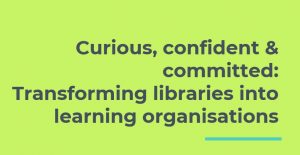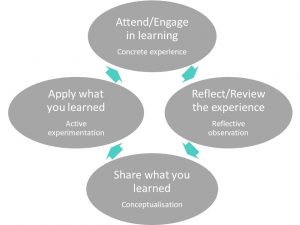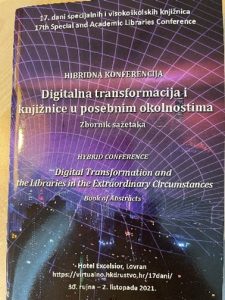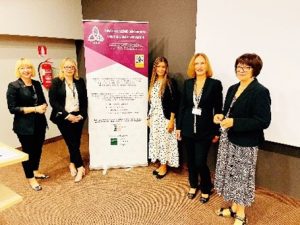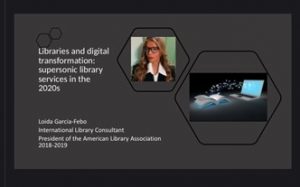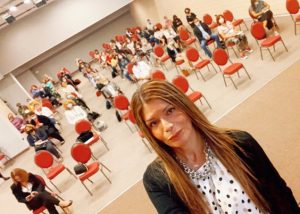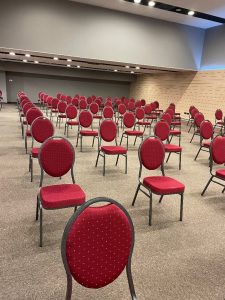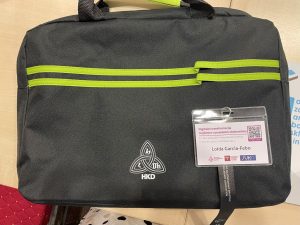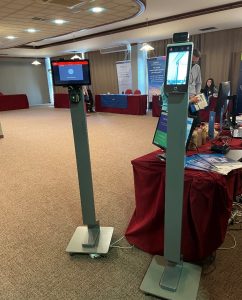Colleagues, we are excited to announce the our second episode of the CPDWL Podcast Project (Season 3) where we feature library and information professionals who support and participate in professional development work. This episode is in German.
To see the episode, see here: https://anchor.fm/ifla-cpdwl/episodes/S3E2-Ulrike-Lang-and-Almuth-Gastinger-in-Germanauf-Deutsch-e18s665
Our guests are Ulrike Lang, CPDWL Co-Chair, Almuth Gastinger, CPDWL Secretary.
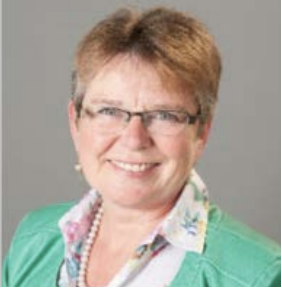
Ulrike Lang
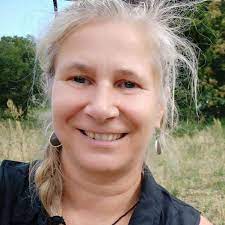
Almuth Gastinger
Transcript and translation are below. Transcribed/Translated by Ulrike Lang and Almuth Gastinger.
Transcript
Ulrike: Herzlich willkommen zu einer neuen Folge des Podcasts der IFLA Sektion für berufliche Fort- und Weiterbildung, CPDWL. Mein Name ist Ulrike Lang. Ich bin derzeit Chair der Sektion und Organisatorin der Coaching Arbeitsgruppe. Bis 2020 war ich in der Staats- und Universitätsbibliothek Hamburg Carl von Ossietzky zuständig für die Ausbildung, die Fort- und Weiterbildung, sowie für Gesundheitsmanagement und Suchtprävention. Unterhalten möchte ich mich heute über die Anfänge, Entwicklung und Zukunft des Coaching Programms der IFLA mit Almuth Gastinger, die sich am besten selbst vorstellt.
Almuth: Ja, ich heiße also Almuth Gastinger und arbeite als Fachreferentin für Mathematik und Maschinenbau an der Bibliothek der Norwegischen Universität für Naturwissenschaften und Technologie (kurz NTNU genannt) in Trondheim. Ich bin aber Deutsche und habe an der TU Ilmenau studiert und promoviert, bevor ich vor 24 Jahren nach Norwegen gezogen bin. Seit August diesen Jahres bin ich Schriftführerin der Sektion CPDWL, und ich bin wie Ulrike bei der Coaching-Arbeitsgruppe dabei.
Almuth fragt: Ulrike, wie bist Du eigentlich zu der Arbeitsgruppe gekommen?
Ulrike: Von Beginn an ab 2017 war ich Mitglied der Planungsgruppe. Damals nur als Consultant der Sektion, da meine offizielle vorherige Amtszeit von 2007 bis 2015 beendet war. 2015 wurde ich zwar Mitglied der Sektion für Aus- und Fortbildung, aber mein Herz und meine beruflichen Neigungen hingen weiter an den angeschobenen Projekten von CPDWL. Daher habe ich mich dieser interessanten Arbeitsgruppe zum Coaching gleich angeschlossen.
Ulrike: Und Du?
Almuth: Ich konnte mich gar nicht mehr genau erinnern, ab wann ich dabei war, aber die Unterlagen zeigen, dass ich auch schon seit 2017 dabei bin. Auf dem Weltkongress in Wroclaw hat sich unsere Arbeitsgruppe das erste Mal getroffen und angefangen, ein Konzept für ein Coaching-Pilotprogramm auf dem Weltkongress 2018 in Kuala Lumpur zu erarbeiten. Das war sehr spannend und ist es immer noch.
Almuth fragt: Und warum genau bietet denne CPDWL Coaching an?
Ulrike: das Ziel der Sektion ist schon seit vielen Jahren, partizipative Veranstaltungsformate anzubieten, die über das reguläre Vortragsformat hinausgehen und die Teilnehmenden in ihrer Kreativität fordern und fördern, denn für reine Vortragsveranstaltungen muss ich nicht mehr um die Welt reisen. So veranstalten wir z.B. gemeinsam mit der Sektion Wissensmanagement seit vielen Jahren auf dem Weltkongress ein sogenanntes Knowledge Café, jährlich zu unterschiedlichsten Themen mit verschiedensten Unterthemen. Dort können und sollen alle Beteiligten mitdiskutieren und eigene Erfahrungen einbringen. Geplant sind nur die Themen an den runden Tischen, es gibt eine Moderation und eine Person, die die Ergebnisse notiert. Der Verlauf der Diskussion und die eigentlichen Ergebnisse ergeben sich aus den Beiträgen der am Tisch Sitzenden. 2017 kam die Idee auf, ein Coaching auf einfacher Basis anzubieten, da einige aus unserer Sektion aus ihrer direkten Umgebung den Bedarf nach Unterstützung am Arbeitsplatz erfahren haben. Für den Kongress 2018 wurden Gruppencoachings geplant. Wir hatten überhaupt keine Idee, ob das Angebot im Stress der alternativen Veranstaltungen überhaupt angenommen würde und unsere Erwartungen schwankten zwischen “niemand kommt” bis zu “wir werden hoffnungslos überlaufen werden”.
Almuth: Coaching ist ja eine tolle Methode, um sich Herausforderungen zu stellen und Probleme zu lösen, finde ich. Wobei das nicht heisst, dass einem der Coach, sagt, was man tun soll, sondern dass man gemeinsam Lösungen erarbeitet. Coaching wird also definiert als “partnerschaftliche Zusammenarbeit zwischen Coach und Coachee (also die Person, die gecoacht wird) in einem zum Nachdenken anregenden und kreativen Prozess, der die Coachees dazu inspiriert, ihr persönliches und berufliches Potenzial zu maximieren”. Und das wollte unsere Sektion eben allen Teilnehmern des Weltkongresses anbieten.
Ulrike fragt: Erinnerst Du Dich noch, wie unsere Zusammenarbeit mit der Sektion Management & Marketing zustande kam?
Almuth: Ja. Nach dem ersten Durchgang des Coachings während des Weltkongresses in Kuala Lumpur haben wir uns nach einem Partner umgesehen, der erfahrene Kolleginnen und Kollegen in seinen Reihen hat und an einer Zusammenarbeit interessiert sein könnte. Denn nach der ersten Durchführung war uns klar, dass das Programm Potenzial hat, aber eben auch das die Suche nach erfahrenen Kolleginnen und Kollegen, die als Coach eingesetzt werden könnten, nur in unseren eigenen Reihen zu begrenzt ist. Da Management & Marketing in der selben Division, bisher die sogenannte Division 4, gewesen ist, war die Anfrage bei ihnen naheliegend. Außerdem sieht es die IFLA gern, wenn es eine Kooperation oder Zusammenarbeit zwischen Sektionen gibt.
Ulrike: Ja, das stimmt. Seit 2018 nach dem Kongress in Kuala Lumpur arbeiten wir zusammen und das funktioniert richtig gut. Dadurch haben wir noch mehr Ideen für die weitere Arbeit bzw. Umsetzung bekommen, und die Arbeitsbelastung wurde auch besser verteilt. Und seit etwa 2 Jahren haben wir eine Kollegin dabei, die als Educational Coach ausgebildet ist und auch in diesem Bereich beruflich arbeitet. Sie hat für uns die meisten der jetzt vorhandenen Weiterbildungsunterlagen erarbeitet und kostenlos zur Verfügung gestellt. Diese Schulungsdokumente wurden auch in mehrere Sprachen übersetzt, u.a. ins Deutsche. Ich finde, sie sind eine tolle Grundlage, um zu lernen, was Coaching ist und wie eine Coaching-Sitzung durchgeführt wird. Hier also gleich schon einmal der Tipp, sich die Informationen und Dokumenten auf der Website unserer Sektion, zu der man über die Webseite der IFLA kommt, anzuschauen.
Almuth fragt: Ich möchte nochmal auf den IFLA-Kongress 2018 in Kuala Lumpur zurückkommen. Wie genau lief denn nun die erste Coaching-session dort?
Ulrike: Im Vorfeld haben wir bei den Coaches abgefragt, in welchen allgemeinen Themengebieten sie sich fit fühlen würden, z.B. Veränderungsmanagement, Führung, Marketing, Arbeitsorganisation, Wissensmanagement oder Gesundheitsmanagement. Am Eingang des Raumes haben wir eine Übersichtstafel angebracht, an der man sehen konnte, an welchen Tischen welche Coaches mit welchen Themenschwerpunkten zu finden waren. Die Idee war nun, dass Kolleginnen und Kollegen am Eingang eine Einteilung der interessierten Coachees vornehmen sollten. Das hat nicht immer geklappt, vor allem hat es durchaus schon zu längeren Diskussionen am Eingang geführt, was ja nicht unbedingt Sinn der Sache gewesen ist. Da der Ansturm dann doch erheblich größer war, als von uns vermutet, mussten wir auch gleich mehrere Interessierte pro Tisch zuweisen. Die Coaches sollten dann jeweils selbst entscheiden, ob es quasi zu einem Gruppencoaching kam, wenn die Themen ähnlich oder identisch waren oder man die Diskretion soweit aufgeben konnte, dass andere Interessierte zuhörten, während man mit einem Coachee sein/ihr Problem besprach.
Almuth: Ja, ich erinnere mich noch gut daran, dass es ein wenig chaotisch war. Eines der Probleme, dass sich herausgestellt hat, war dass viele Interessierte gar nicht wussten, was Coaching ist. D.h. viele haben erwartet, dass man ihnen Tipps gibt, wie man Probleme löst oder in der Karriere weiterkommt. Also eher ein Mentoring, eine Beratung. Manche Teilnehmer hatten auch einfach nur Fragen zum Weltverband IFLA und wie dieser arbeitet, d.h. sie wollten nichts weiter als eine Antwort auf eine Frage. Und wenn man nur eine konkrete Information möchte, da passt natürlich auch kein Coaching,
Ulrike: Das stimmt. Zu meinem Tisch kamen fast gleichzeitig fünf Kolleginnen, alle aus dem Nahen Osten, die sich zwar nicht kannten, aber dennoch einen Tisch gemeinsam aufsuchen wollten. Und die Fragen waren eher so, dass ich sie als Kollegin mit langjähriger Berufserfahrung schnell hätte beantworten können. Oder es waren Fragen zu den Strukturen der IFLA. Ich habe die Zeit dann zum Teil dazu genutzt, sie über die Spielregeln des Coachings aufzuklären.
Almuth: Und was haben wir daraus gelernt, d.h. was wurde dann auf dem IFLA-Kongress 2019 in Athen anders gemacht?
Ulrike: Als erstes haben wir die Themenaufteilung beendet und als weiteres Kriterium die Sprachkenntnisse eingefügt. Manchmal ist es ja schon eine Herausforderung, das Problem, welches einen umtreibt, präzise zu beschreiben. Viel schwieriger ist es dann noch, dies in einer fremden Sprache zu tun. Uns war klar, dass die meiste Nachfrage nach englischem Coaching bestehen würde, aber Ziel war es, daneben wenigstens die offiziellen weiteren IFLA-Sprachen anbieten zu können, also Arabisch, Chinesisch, Französisch, Russisch, Spanisch und Deutsch. Unsere Coaches konnten sogar noch weitere Sprachen hinzufügen wie z.B. Italienisch und Schwedisch. Und natürlich ist es auch für einen Coach leichter, die richtigen, konkreten Fragen in ihrer/seiner Muttersprache zu stellen, denn im Coaching ist es ja viel wichtiger für einen Coach, die richtigen Fragen zu stellen, als detaillierte Kenntnisse des Problemkomplexes zu haben. Daher machte die Themenaufteilung wirklich keinen Sinn. Die Kolleginnen und Kollegen am Eingang hatten vielmehr die Tische im Blick und haben dafür gesorgt, dass die interessierten Coachees nicht zu lange auf ein Gespräch in der von ihnen gewünschten Sprache warten mussten.
Almuth: Ja, das war eine deutliche Verbesserung, finde ich. Individuelles Coaching ist natürlich viel besser als Gruppencoaching. Wir haben ja 30 Kolleginnen und Kollegen als Coaches werben können und mehr als 50 Konferenzteilnehmer haben sich dann coachen lassen. Die Coaching sessions dauerten so um die 30 min, einige aber noch länger. Um das ganze logistisch besser handhaben zu können, gab es eine kleine Gruppe, die die Teilnehmer willkommen geheißen hat, die Email-Adressen registriert und die Leute dann zu den passenden Coaches geführt hat. Und nach den Gesprächen wurde dann auch ein erstes Feedback erfragt, d.h. mit einem entsprechenden Smiley. Ein konkretes Feedback haben wir ja nach dem Kongress eingeholt, mit einer kleinen Umfrage, die Coaches und Coachees beantworten sollten und auch getan haben. Alle Rückmeldungen waren sehr positiv, d.h. der Coaching-Ansatz wird als eine exzellente Methode angesehen, um eigene Leistungen zu verbessern und um Probleme zu lösen. Wobei die Coaches auch diesmal berichteten, dass es zum Teil schwierig ist, Coaching und Mentoring zu trennen. Coaching heißt ja, sehr aufmerksam zuzuhören und offene Fragen zu stellen, so dass der/die Coachee selbst die beste Lösung findet. Das ist aber eben oft schwerer, als einfach zu beraten und Tipps zu geben.
Was wir noch gemacht haben, war ja die Organisation eines Webinars zum Thema Coaching im Mai 2019, also vor dem Kongress in Athen. Das war vor allem ein Angebot an diejenigen, die sich bereit erklärt hatten, als Coaches zu fungieren. Es wurde also darüber gesprochen, was Coaching eigentlich ist, welche Methoden es gibt, wie man offene Fragen stellt und welche Herausforderungen entstehen können. Ein richtig gutes und nützliches Webinar.
Almuth: Und für 2020 waren wir auch gut vorbereitet auf eine neue Runde Coaching, die auf dem Weltkongress in Dublin stattfinden sollte, der dann ja aber leider abgesagt werden musste.
Ulrike: Genau. In zahlreichen Zoom Meetings der Arbeitsgruppe haben wir einstündige Online Coachings geplant und zwar genau in der Woche, in der ursprünglich der Kongress hätte stattfinden sollen. Wir sind davon ausgegangen, dass sich viele Kolleginnen und Kollegen diesen Zeitraum eh für die Teilnahme reserviert hatten. 14 Kolleginnen und Kollegen hatten sich für dieses Online Coaching als Coach zur Verfügung gestellt und ich glaube, online zu coachen war für alle neu. Um die Coaching-Sitzungen zu buchen, haben wir das Tool Calendly benutzt. Das hatte aber leider eine eingeschränkte Funktionsweise, zumindest für unsere Zwecke, vor allem was die Buchungen in verschiedenen Zeitzonen betrifft. Jede Buchung musste händisch eingepflegt werden. Weshalb wir uns entschieden haben, ein neues Tool zu suchen, d.h. wir sind dann für 2021 bei Squarespace scheduling gelandet.
Worauf unsere Arbeitsgruppe noch sehr stolz sein kann, finde ich, sind die schon erwähnten Schulungsunterlagen in allen 7 IFLA-Sprachen. Unsere Kollegin aus Kanada, die auch als zertifizierter Coach arbeitet, hat diese Dokumente wie gesagt 2020 erarbeitet, und Kolleginnen und Kollegen aus aller Welt haben diese dann übersetzt. Du und ich haben dabei die Übersetzung ins Deutsche übernommen. Und zusätzlich zu den Schulungsunterlagen, die in der englischen Sprache auch als Videos aufgenommen wurden, haben wir auch noch Webinare durchgeführt. D.h. Vera Keown, die erwähnte Kollegin aus Kanada, stand für Fragen und Diskussionen live zur Verfügung. Und da die am Coaching interessierten Kollegen in der ganzen Welt verteilt sind, wurden die Webinare passend zu verschiedenen Zeitzonen angeboten.
Die Schulungsunterlagen bestehen aus 5 Teilen, angefangen von einer Einführung ins Coaching, über Coaching-Prinzipien und das Coaching-Gespräch, bis hin zu Fertigkeiten, was das Zuhören und Feedback-geben anbelangt.
Zum Beispiel vermitteln die Unterlagen die Unterschiede zwischen Management, Mentoring, Beratung und Coaching. Sie zeigen auf, welche Herausforderungen Coaching angehen kann, wie z.B. eine Optimierung der Arbeitsleistung, die Definition von eigenen Stärken und Schwächen, Karrierechancen, oder eine Verbesserung der Unternehmensführungsstrategien. Es wird auch vermittelt, was aktives Zuhören bedeutet, sowie die Definition von offenen Fragen, natürlich immer mit entsprechenden Beispielen.
Almuth: Offene Fragen sind ja nicht so einfach, denn sie werden ja gestellt, um den Coachee zum Nachdenken anzuregen. Oft stellt man nur Fragen, auf die man mit einem Ja oder Nein antwortet, was aber beim Coaching nicht weiterhilft.
Einfache und kraftvolle offene Fragen sind zum Beispiel.
Was wollen Sie erreichen?
Wie sieht für Sie Erfolg aus?
Wie haben Sie in der Vergangenheit Probleme gelöst?
Was werden Sie tun?
Und um mal offene und geschlossene Fragen gegenüberzustellen, habe ich noch 2 Beispiele:
Eine geschlossene Frage wäre “Gibt es einen Grund, warum Sie feststecken?” Während eine offene Frage wäre: “Was steht dem im Weg?”
Oder ein anderes Beispiel:
Statt nur zu fragen “Haben Sie mit Ihrem Vorgesetzten gesprochen?” sollte man lieber fragen “Was haben Sie bereits getan, um das Problem anzugehen?”.
Ulrike: Sehr gute Beispiele, Almuth. Ich mag ja auch Fragen wie: Was sind Ihre Stärken oder auch Was wird passieren, wenn Sie nichts tun? Aber gehen wir doch noch ein bisschen genauer auf unsere Erfahrungen in diesem Jahr ein.
Almuth: Ja klar. Für dieses Jahr, also 2021, in dem der Weltkongress jetzt im August online stattgefunden hat, hatten wir uns entschieden, Coaching auch wieder online anzubieten. Diesmal in der Woche vor dem Kongress und in der Woche danach, um allen, die am weiteren Programm des Kongresses teilnehmen wollten, keine Terminkollisionen zu bescheren. Wir haben über verschiedene soziale Medien angefragt, wer als Coach in unserem Programm mitmachen möchte und haben 25 positive Antworten erhalten. Und die ersten Rückmeldungen von Coaches und Coachees zeigen, dass es wieder ein Erfolg war. Vor allem die Coachees sind sehr dankbar, die Möglichkeit zu bekommen, gecoacht zu werden. Es gibt natürlich immer noch Verbesserungsmöglichkeiten, vor allem in der Organisation, darüber werden wir dann in den kommenden Monaten in unserer Arbeitsgruppe genauer sprechen.
Ulrike: Die Rückmeldungen sind sehr positiv. Insgesamt hatten wir 122 Buchungen. Ich weiß allerdings nicht genau, wie viele davon wirklich stattgefunden haben. Ich hatte z.B. auch eine Anfrage, da hat sich der Coachee aber nach der ersten Kontaktaufnahme nie wieder gemeldet. Für Coaches wurde im Vorfeld vereinbart, dass nach der ersten Terminanfrage ein Link zu den Informationen zur Vorbereitung für Coachees verschickt wird. Diese Informationen sind auch auf unserer Website hinterlegt und enthalten fünf kurze Fragen, deren Beantwortung es dem Coach etwas leichter machen sollte, sich auf das Gespräch vorzubereiten. Sobald die Antworten bei mir eintrafen, habe ich den Link für unser Zoom Meeting verschickt. Vielleicht auch interessant: Meine 12 Buchungen waren alle mit Zoom als Plattform einverstanden. Das scheint sich also jetzt in den Zeiten der Pandemie wirklich als eine sehr verbreitete Plattform weltweit etabliert zu haben.
Almuth: Ich war ja diesmal nicht als Coach dabei, d.h. ich kann nicht aus eigener Erfahrung sprechen. Aber Du kannst das. Erzählst Du noch etwas mehr darüber, wie Du die diesjährigen Coaching-Sitzungen empfunden hast? Welche Themen gab es und woher kamen eigentlich Deine Coachees?
Ulrike: Das war wirklich ein bunter Strauß quer über den Globus. Interessanterweise wurde nur ein Coaching auf deutsch bei mir angefragt von einer Kollegin aus der Schweiz. Da ging es um eine zukünftige Führungsaufgabe. Die anderen kamen aus Irland, Kroatien, Russland, Südafrika, dem Iran, Südkorea, Puerto Rico, Bolivien und dem Libanon. Einige Themenstellungen wären grundsätzlich besser für ein Mentoring geeignet gewesen, z.B. wenn es darum ging wie man Auslandskontakte bekommt für ein Praktikum. Wiederkehrendes Coaching-Thema war aber z.B. auch Work-Life-Balance und Burnout oder die Problematik der Überlastung weil man nicht gut im Delegieren ist. Das Nicht-Delegieren können oder die Angst, wichtige Tätigkeiten abzugeben und dadurch an Einfluss und Wissen zu verlieren, ist übrigens ein ganz typisches Coaching Thema, auf das man wunderbar mit den schon erwähnten offenen Fragen reagieren kann. Genauso bei Schwierigkeiten im oder mit dem Team.
Die Gespräche waren jedenfalls alle super spannend, alle waren sich einig, dass die eine Stunde gut investierte Zeit gewesen ist und mit einigen werde ich weiterhin im Kontakt bleiben, einfach weil es mich interessiert, wie es für sie weitergeht und was sie umsetzen können. Und auch sie möchten mit mir im Gespräch bleiben, ganz außerhalb eines regulären Coachings.
Gerade die Gespräche mit den Kolleginnen aus dem Iran und dem Libanon waren für mich extrem interessant. Natürlich wurde zumindest am Rande auch immer das Thema Pandemie gestreift, aber ich habe z.B. nicht gewusst, dass Homeoffice für viele Beschäftigte im Libanon nicht aus Gründen der Eindämmung der Pandemie angeordnet wird, sondern auf Grund von Mängeln in der Energieversorgung, z.B. um den Nahverkehr zu entlasten oder die Stromversorgung, die während unseres Gesprächs mehrfach in Beirut unterbrochen wurde.
Und die meisten hatten noch nie an einer IFLA Konferenz teilgenommen und freuten sich sehr über dieses niederschwellige Angebot. Das ist vielleicht auch ein wichtiger Hinweis für die Offiziellen bei der IFLA, dass die Online-Konferenz mit einem reduzierten Teilnahmebetrag einen anderen Kreis von Teilnehmenden eröffnet.
Almuth fragt: Das hört sich ja richtig spannend an. Sowohl was die Themen angeht als auch die Herkunft Deiner Coachees. Wie sieht es denn IN deutschland aus, d.h. haben denn deutsche Bibliotheksverbände schon einmal Coaching für ihre Mitglieder angeboten?
Ulrike: Es gab vor einigen Jahren mal ein Angebot des Mentoring beim Berufsverband Information Bibliothek BIB. Eine Handvoll Mentor*innen bekam eine Handvoll Mentees zugeteilt. Dabei wurde darauf geachtet, dass eine gewisse räumliche Nähe bestand und die Institutionen vergleichbar waren, also z.B. beide aus wissenschaftlichen Bibliotheken oder beide aus Öffentlichen.
Ich selbst habe auch dabei als Mentorin teilgenommen mit einem Mentee aus der Nähe von Berlin. Wir haben uns lediglich auf dem Bibliothekartag in Berlin kennengelernt und danach per Skype, Telefon und Email Kontakt gehalten. Etwas über ein Jahr haben wir miteinander kommuniziert, wobei es für uns beide das erste Mal war und ich das Gefühl hatte, dass es meinem Mentee mehr darum ging, jemand Aussenstehenden zu haben, die die Probleme anhörte, als den Lösungen zu folgen, die ich versucht habe anzubieten. Im Mentoring ist es ja ganz ähnlich wie im Coaching. Beide Seiten müssen unbedingt dazu bereit sein, sich auf das Verfahren einzulassen. Was letztendlich Coachee oder Mentee aus dem Besprochenen und Erlebten machen, ist allein ihre Sache.
Almuth: Ich kann auch noch kurz über ein Angebot in Norwegen berichten. Auch wenn der Fokus dabei nicht auf Coaching liegt, denke ich, dass es interessant ist.
Die Norwegische Vereinigung der Bibliothekare, einer von mehreren Bibliotheksverbänden in Norwegen, hat im September 2019 ein sogenanntes Mentorenprogramm für Bibliothekchefs gestartet. Alle Bibliotheksleiter in Norwegen können daran teilnehmen, egal ob sie Mitglied im Verband sind oder nicht. Das Programm hat zum Ziel, den Erfahrungsaustausch zu fördern, Weiterbildungsmöglichkeiten anzubieten, Netzwerke und Beziehungen zu stärken, auch zwischen Mitarbeitern unterschiedlicher Bibliothekstypen, und die Entwicklung des Bibliothekswesens generell positiv zu beeinflussen.
Der Bibliotheksverband arrangiert dabei Meetings zwischen Managern, die sich in unterschiedlichen Phasen ihrer Karriere befinden. D.h. ein Manager oder eine Managerin, der/die noch eher wenig Erfahrungen hat, wird sich mit jemandem treffen, die/der schon länger eine Leitungsfunktion innehat. Und umgekehrt. Der- oder diejenige, die sich beraten lassen möchten, können bis zu 3 Mentoren vorschlagen. Es wird erwartet, dass sich die Teilnehmenden weiterentwickeln wollen, dass sie offen für Input von anderen sind, über eigene Herausforderungen reflektieren, sich voll auf das Programm konzentrieren und sich Zeit für 6-8 Treffen pro Jahr nehmen.
U.a. werden Bzw wurden folgende Themen vorgeschlagen:
- Die Rolle als Leitungsperson.
- Ein schwieriges Gespräch.
- Die Karriere.
- Leitungsanforderungen und Leitungsstile.
- Stärken und Schwächen als Managerin.
Ich glaube, dieses Programm ist eine Mischung aus Coaching und Mentoring, aber man hat es eben Mentorenprogramm genannt. Wer mehr dazu hören möchte, kann mich gern kontaktieren.
Ulrike: Das ist auch eine interessante Initiative. Manche Zuhörerin und mancher Zuhörer mag denken, wozu braucht es eigentlich ein Coaching im internationalen Rahmen, wie es mit der Initiative von CPDWL und M&M in der IFLA angeboten wird. Das kann ich doch in meiner Bibliothek, meiner Institution zuhause haben mit Vorgesetzten oder mit jemandem aus dem Kollegenkreis. Doch es wird auch manche geben, die befürchten einen Gesichtsverlust oder Nachteile in der eigenen Hierarchie, wenn sie Schwächen eingestehen oder offen Probleme artikulieren, z.B. mit dem Team. Das ist natürlich von Kultur zu Kultur unterschiedlich, aber ich habe bei meinen Coachings mehrfach die Rückmeldung erhalten, dass es von Coachees als äußerst angenehm empfunden wurde, dass der Coach nicht zur eigenen Organisation gehört und die beteiligten Personen nicht kennt und im Vorfeld das Problem nicht bewertet.
Almuth: Ich kann das nur bestätigen. Ich persönlich würde auch einen Coach bevorzugen, der nicht aus meiner eigenen Institution kommt. Da muss ich dann nicht überlegen, was ich sagen kann oder sollte, sondern wirklich richtig offen und ehrlich sein.
Ulrike: Um noch einmal auf das nationale norwegische Programm zurückzukommen. Vor kurzem war unser Arbeitsgruppenmitglied Vera Keown an einem weiteren Webinar zum Coaching beteiligt. Dabei wurde auch über das kanadische Programm des Bibliotheksverbandes von British Columbia kurz erwähnt. Bedingt durch die Corona Pandemie wurden dort für 2021 Gelder bereitgestellt, um den Verbandsmitgliedern bis zu zehn Sitzungen mit professionellen Coaches zu ermöglichen. Der Verband trägt dabei 50 % der Kosten. Wir möchten mit den kanadischen Kolleginnen und Kollegen kooperieren und über Blog, Webinar oder Podcast unsere gemeinsamen Vorstellungen verbreiten.
Almuth: Stimmt, über Kosten haben wir ja noch gar nicht gesprochen. Ein professionelles Coaching kann ja wirklich schnell ins Geld gehen, denn die Stundensätze von professionellen Coaches sind meistens ziemlich hoch und oft benötigt man mehrere Sitzungen, um die Fragestellung oder Herausforderung ausreichend zu behandeln. Und auch deshalb kann diese IFLA Initiative ein sehr guter Einstieg dafür sein, kostenlos zu prüfen (kostenlos jedenfalls für registrierte Teilnehmende des Weltkongresses), ob diese Methode mir bei der Problemlösung helfen kann.
Ulrike: Das sehe ich genauso. Deshalb hoffen wir sehr, dass unser Vorschlag, für die Konferenz im kommenden Jahr in Dublin sowohl eine Session vor Ort mit Coaches und Coachees als auch erneut das Online Coaching via Zoom oder anderer Meeting Plattformen anbieten zu können, angenommen wird.
Unsere Vorstellung ist dabei, dass wiederum jede/jeder angemeldete Teilnehmende entweder ein face to face oder ein Online Coaching buchen kann. Vorausgesetzt die Registrierungsgebühr für die entsprechende Teilnahmeform wurde an die IFLA entrichtet. Das prüft die IFLA dann nach Eingang der Anmeldung bei uns.
Almuth: Damit sind wir ja schon bei den Planungen für 2022. Unsere Arbeitsgruppe hat ja auf ihrem letzten Online-Treffen beschlossen, dass es nach Möglichkeit wieder eine zweistündige Veranstaltung in Dublin geben soll und daneben eben die Online Coachings in der Woche vor und der Woche nach dem Kongress, um zeitliche Kollisionen mit anderen Programmen zu vermeiden. Ausserdem werden wir im Rahmen der Projektförderung durch die IFLA eine finanzielle und personelle Unterstützung für die Buchungsplattform beantragen. Squarespace ermöglicht nämlich nicht nur die Terminbuchung, sondern auch das Einfügen von Fotos der Coaches und eine kurze Biographie derselben. Das wollen wir für die nächste Buchungsperiode verpflichtend machen.
Ulrike: Ja, das ist eine sinnvolle Ergänzung. Ich habe am Ende meiner diesjährigen Coaching Sitzungen immer gefragt, warum sie denn ein Coaching bei mir gebucht haben. Die Coaches waren alphabetisch nach Vornamen gelistet und am Anfang hatte ich vermutet, dass ich gar keine Buchung erhalten würden, denn mit U war ich der vorletzte Eintrag in der Liste und hatte nicht erwartet, dass viele bis ganz nach unten scrollen würden. Daher war ich dann doch sehr überrascht, dass es letztendlich 12 Buchungen wurden. Die Antwort war dann von einigen, dass sie nach Bildern geschaut hatten, wer sympathisch aussah, aber auch, wer schon etwas älter war, weil man dort mehr Erfahrung vermutete. Es ist also sehr sinnvoll, für alle Coaches Bilder und kurze Beschreibung des Arbeitsumfeldes einzufügen.
Daneben wollen wir noch Stimmen von diesjährigen Teilnehmenden sammeln, die ein bisschen ausführlicher über ihre Erfahrungen berichten. Natürlich anonym. Das ist bestimmt auch interessant für diejenigen, die noch überlegen, ob sie in der Zukunft mal teilnehmen sollten. Diese Stimmungsbilder werden wir im CPDWL Blog oder unserem nächsten Newsletter im Januar 2022 veröffentlichen.
Es lohnt sich also in der Zukunft, mindestens einem Social Media Kanal der Sektion für berufliche Fort- und Weiterbildung zu folgen, wenn man am Thema Coaching interessiert ist.
Und da wir schon von einem weiteren europäischen Bibliotheksverband und einer deutschen Fachhochschule zu unseren Erfahrungen angefragt worden sind, werden wir als Arbeitsgruppe sicherlich auch mit weiteren Publikationen, die über unsere Arbeit berichten, beschäftigt sein.
Ach ja und falls Sie, liebe Zuhörende, Interesse haben, als Coach bei uns mitzumachen oder Dokumente und Informationen in welche Sprache auch immer zu übersetzen, melden Sie sich doch bitte. Und den Gender Gap würden wir natürlich auch gerne verkleinern, denn sowohl bei den Coaches und unserem Übersetzungsteam, als auch den Coachees sind die weiblichen in der deutlichen Überzahl. Für interessierte Coachees wird es Aufrufe geben, wenn wir Termine festgelegt haben.
Jetzt hoffen wir, dass wir ein paar Fragen rund ums Coaching und die Coaching Initiative der IFLA, getragen von den Sektionen Continuing Professional Development and Workplace Learning und der Sektion Management & Marketing beantworten konnten.
Danke Almuth, es hat Spaß mit Dir gemacht.
Almuth: Ich fand das Gespräch mit Dir auch sehr gut und interessant. Und wenn Sie als Zuhörer noch Fragen haben, schauen Sie auf unsere Webseite unter https://www.ifla.org/units/cpdwl/. Dort finden Sie auch unsere Kontaktdaten. Oder sie folgen uns auf Twitter, Instagram, Facebook.
Translation into English / Podcast CPDWL in German
Ulrike: Welcome to a new podcast of the IFLA Continuing Professional Development and Workplace Learning Section, CPDWL. My name is Ulrike Lang. I am currently chair of the section and organiser of the coaching working group. Until 2020 I was staff member of the State and University Library Hamburg Carl von Ossietzky, responsible for Education and Training, as well as for health management and addiction prevention. Today I would like to talk about the beginning, development and future of IFLA’s coaching programme with Almuth Gastinger, who best introduces herself.
Almuth: Yes, my name is Almuth Gastinger and I work as an academic or subject librarian for Mathematics and Mechanical Engineering at the library of the Norwegian University of Science and Technology (called NTNU) in Trondheim in Norway. However, I am German and have studied and done my PhD at the Technical University Ilmenau, before I moved to Norway 24 years ago.
Since August 2021 I am the secretary of the CPDWL section, and like Ulrike I am a member of the coaching working group.
Almuth: Ulrike, how did you actually get to this working group?
Ulrike: From the beginning of 2017, I was a member of the planning group. At that time only as a consultant of the section, as my official previous term of office from 2007 to 2015 had ended. In 2015 I became a member of the Section for Education and Training, but my heart and professional inclinations continued to depend on the CPDWL projects that had been initiated. That’s why I immediately joined this interesting working group on coaching.
Ulrike: What about you?
Almuth: When I first thought about it, I could not remember exactly when I joined the working group, but the documents show that this was also in 2017. Our working group met the first time at the world congress in Wroclaw and began to work on a concept for a coaching pilot programme for the world library and information congress (WLIC) 2018 in Kuala Lumpur. That was really exciting and still is.
Almuth: But why exactly did CPDWL want to offer coaching?
Ulrike: For many years, the aim of the section has been to offer participatory event formats that go beyond the regular lecture format and challenge and promote the participants in their creativity, because I no longer have to travel around the world for pure lecture events. For example, together with the Knowledge Management Section, we have been organising a so-called Knowledge Café at the annual WLIC for many years, on a wide variety of topics with lots of different subtopics. There, all participants can and should join in the discussion and contribute their own experiences. Only the topics at the round tables are planned, with a moderation and a person who notes down the results. At each table. The course of the discussion and the actual results result from the contributions of those sitting at the table. In 2017, the idea arose to offer coaching on a simple basis, as some of our section members experienced the need for support in the workplace from their immediate environment. Group coaching sessions were planned for the 2018 congress. We had no idea at all whether the offer would be accepted with lots of alternative events available, and our expectations varied from “no one will come” to “we will be hopelessly overrun”.
Almuth: Coaching is a great method to meet challenges and solve problems, in my opinion. However, that does not mean that the coach will tell you what to do, but you will work on solutions together. Coaching is defined as “partnering with clients in a thought-provoking and creative process that inspires them to maximize their personal and professional potential”. And exactly that was what our section wanted to offer to all participants of the WLIC.
Ulrike: Do you remember how our cooperation with the Management & Marketing Section started?
Almuth: Yes, I do. After the coaching pilot programme in 2018 in Kuala Lumpur we realised that we need a partner section with professional colleagues among them and who would be interested in collaborating. We knew that the coaching programme has potential for being successful, but we also knew that finding coaches only among our own section members would be limited. Since the Management & Marketing section is in the same Division, in the former IFLA structure it was Division 4, it was obvious to ask them. In addition, IFLA likes its sections to co-operate.
Ulrike: Right. After the conference 2018 in Kuala Lumpur, we started to work together and this works very well. As a result, we got even more ideas for further work or implementation, and the workload was also better distributed. And for about 2 years we have had a colleague in our group who is trained as an educational coach and also works professionally in this area. She has prepared most of the training documents now available for us and made them available free of charge. These training documents have also been translated into several languages, including German. I think they are a great foundation for learning what coaching is and how to conduct a coaching session. So here there is a first hint to take a look at the information and documents on the website of our section, which can be accessed via the IFLA website.
Almuth: I would like to get back to the IFLA congress 2018 in Kuala Lumpur. Ulrike, can you tell us how exactly this was going?
Ulrike: Before the conference, we asked the coaches in which general topics they would feel fit to coach, for example change management, leadership, marketing, work organization, knowledge management or health management. At the entrance of the meeting room we installed an overview board where you could see at which tables which coaches with which main topics could be found. The idea was that colleagues at the entrance should make a classification of the interested coachees and allocate them to the right coach. That did not always work well, it often led to longer discussions at the entrance, which was not necessarily the point of the matter. Since the rush was much greater than we expected, we also had to assign several interested coachees per table. The coaches should then decide for themselves whether there would be a group coaching if the topics were similar or identical, or whether they could give up discretion to such an extent that other interested parties listened while discussing his/her problem with.
Almuth: Yes, I remember quite well that it was a bit chaotic. One of the problems that emerged was that many interested colleagues did not know what coaching is. That means, many of them expected to get advice how to solve their problems or how to get onwards in their career. So rather mentoring or guidance. And some of the participants had only questions about IFLA as an organisation and how it works. So, they only wanted an answer to their question. And if you only want a specific information, coaching might not be the appropriate method.
Ulrike: That’s right. Five colleagues came to my table almost at the same time, all from the Middle East, who did not know each other, but still wanted to visit a table together. And the questions were rather such that I could have answered them quickly as a colleague with many years of professional experience. Or there were questions about the structures of IFLA. I then used some of the time to teach them the rules of coaching.
Almuth: And what did we learn from this pilot, that means what did we do differently at the congress 2019 in Athens?
Ulrike: First, we finished the topic division and added language skills as a further criterion. Sometimes it is a challenge to describe the problem that concerns you precisely. But it is often much more difficult to do this in a foreign language. It was clear to us that most of the demand would be for English coaching, but the aim was to offer coaching in at least all the official IFLA languages, which are Arab, Chinese, French, Russian, Spanish and German. Our coaches could also add more languages, for example Italian and Swedish. And of course, it is much easier for a coach to ask the right and specific questions in her/his mother tongue. Because in coaching, it is much more important for a coach to ask the right questions than to have detailed knowledge of the complex problem. Therefore, the division of topics really did not make sense. Instead, the colleagues at the entrance had an eye on the tables and ensured that the interested coachees did not have to wait too long for a conversation in the language they wanted.
Almuth: Yes, in my opinion, that was a huge improvement. Individual coaching is much better than group coaching, of course. We had managed to get 30 coaches in the end, and more than 50 congress participants could get coaching. The coaching sessions lasted about 30 min, but some lasted longer. In order to manage the logistics well, a small group welcomed the participants at the entrance of the room, registered their email addresses, and led the coachees to the best suitable coach. And after the conversations we asked for a first feedback with a fitting smiley.
A detailed feedback was obtained after the congress, so we sent out a small survey that coaches and coachees should reply to, what they did. All feedback was really positive, that means the coaching method is seen as an excellent method to improve the own performance and to solve problems. However, the coaches did mention again that it is rather difficult to separate coaching from mentoring. Coaching means to listen carefully and to ask open questions, so that the coachee herself/himself can find the best solution. But this is often more difficult than to just give advice or specific tips.
What we also did was to organise a webinar about coaching. That was in May 2019, so before the congress. That was particularly an offer to the colleagues who had said they would serve as coach. The webinar discussed what coaching is, what coaching methods there are, how to ask open questions and what challenges could arise. A very good and useful webinar.
Almuth: And we were also well prepared for a new round of coaching in 2020 at the planned congress in Dublin, but unfortunately the congress had to be cancelled then.
Ulrike: Well, in several zoom meetings the working group had planned one hours long online coaching sessions, exactly during the week in which the congress was originally supposed to take place. We assumed that many colleagues had reserved this period for participation anyway. 14 colleagues had made themselves available as coaches for this online coaching and I think coaching online was new for everyone. To book the coaching sessions, we used the Calendly tool. Unfortunately, this had a limited functionality, at least for our purposes, especially concerning bookings in different time zones. Each booking had to be entered manually. That’s why we decided to look for a new tool, and we ended up with Squarespace scheduling for 2021.
What our working group can be very proud of, I think, are the training materials already mentioned that exist in all 7 IFLA languages. As already said, our colleague from Canada, who also works as a certified coach, prepared these documents in 2020, and colleagues from all over the world helped translating them. You and I have done the translation into German. And in addition to the training materials, which were also recorded in English, Vera Keown, the mentioned colleague from Canada was available live for questions and discussions. And since the colleagues interested in coaching are spread all over the world, the webinars were offered according to different time zones.
The training materials consist of 5 parts, ranging from an introduction to coaching, coaching principles and the coaching conversation, to skills in listening and giving feedback.
For example, the documents convey the differences between management, mentoring, consulting and coaching. They show which challenges coaching can tackle, such as optimising work performance, defining one’s own strengths and weaknesses, career opportunities, or improving corporate management strategies. It also conveys what active listening means, as well as the definition of open questions, of course always with appropriate examples.
Almuth: Yes, asking open questions can be tricky. Because you ask such questions in order to provoke new thoughts. But more often one only asks questions that can be answered with a simple yes or no. And that does not help when coaching, of course. Some simple but powerful open questions are for example:
What do you want?
What does success look like?
How have you solved problems in the past?
What are you going to do?
And in order to distinguish open from closed questions, I will give you two examples:
A closed question would be “Is there a reason you are stuck?”, while an open question would be “What is getting in your way?”.
And another one:
Instead of just asking “Did you try talking to your manager?” you could rather ask “What have you already done to address the problem?”.
Ulrike: Very good examples, Almuth. I also like questions like: What are your strengths? or What will happen if you do nothing?
But let’s go a little more into detail about our experiences this year.
Almuth: Yes, of course. For this year 2021 when the WLIC in August took place online, we had decided to offer coaching online again. This time in the week before and after the congress, so that there would be no conflicts with the congress sessions. We have asked for coaches via various social media channels and got 25 positive answers.
And the first feedback already shows that the coaching programme was a success again. In particular, the coachees are very grateful for the possibility to get coached. Of course, there is always something that can be improved, and the working group will discuss that during the next months.
Ulrike: Yes, the feedback has been very positive. In total we had 122 bookings. However, I do not know exactly how many of them really took place. For example, I had one request, but the coachee never contacted me again after the first contact. For coaches, it was agreed in advance that after the first appointment request, a link to the information on preparation for coachees will be sent. This information is also stored on our website and contains five short questions, the answers to which should make it a little easier for the coach to prepare for the interview. As soon as I received the answers, I sent the link for our Zoom meeting to my coachees. Maybe also interesting: My 12 coachees all agreed to use Zoom as the meeting platform. So, now in the times of the pandemic, it really looks like Zoom has established itself as a very common platform worldwide.
Almuth: As I have not served as coach this time, I cannot tell about my experiences. But you can do so, Ulrike. Can you tell us a bit more about how your coaching sessions did go? Which topics did you discuss and where did your coachees actually come from?
Ulrike: That was really a colorful bouquet across the globe. Interestingly, only one coaching was requested in German, that was by a colleague from Switzerland. It was about a future management task. The other coachees came from Ireland, Croatia, Russia, South Africa, Iran, South Korea, Puerto Rico, Bolivia, and Lebanon. Some topics would have been better suited for mentoring, for example when it came to how to get international contacts for an internship. However, a recurring coaching topic was a work-life balance and burnout or the problem of work overload because you are not good in delegating. By the way, not being able to delegate or the fear of giving up important activities and thereby losing influence and knowledge is a very typical coaching topic to which you can react wonderfully with the already mentioned open questions. The same applies to difficulties in or with a team.
In any case, the conversations were all super exciting, everyone agreed that the one hour of time had been well spent and I will continue to stay in touch with some of them, simply because I am interested in how things will continue for them and what they can implement. And they also want to stay in touch with me, completely outside of a regular coaching.
Especially the conversations with my colleagues from Iran and Lebanon were extremely interesting for me. Of course, at least on the sidelines, the topic of the pandemic has always been touched upon, but I did not know, for example, that home office is not ordered for many employees in Lebanon for reasons concerning the pandemic, but due to shortcomings in the energy supply, for example to relieve public transportation or the power supply, which was interrupted several times in Beirut during our conversation.
And most of them had never attended an IFLA conference before, so they were very happy about this low-threshold offer this year. This is probably also an important indication for IFLA officials that an online conference with a reduced attendance fee makes it possible for a different circle of colleagues to participate.
Almuth: That sounds very exciting. Both the topics you discussed and the origin of your coachees. Do you know how it looks like in Germany, that means have German library associations offered coaching to their members?
Ulrike: A few years ago, there was an offer of mentoring by the „Berufsverband Information Bibliothek BIB“. A handful of mentors were assigned to a handful of mentees. Care was taken to ensure that there was a certain regional proximity and that the institutions were comparable, for example both from academic libraries or both from public libraries.
I myself also participated as a mentor with a mentee from near Berlin. We just met once at the German Library Conference in Berlin and after that we were in touch via Skype, phone and email. We communicated for a bit more than one year, and this was the first time of being a mentor or mentee for both of us. I felt that my mentee was more interested in having someone outside her institution who listened to the problems than following the solutions I tried to offer. Mentoring is very similar to coaching when it comes to the engagement. That means, it is imperative that both sides are prepared to engage in the process. What the coachee or mentee ultimately do with what they have discussed and experienced is up to them then.
Almuth: I cannot tell you about any offers in Germany, of course. but I thought to talk about a similar project in Norway. The focus was not on coaching either, but I think it is interesting anyway.
The Norwegian Union of Librarians, one of several library associations in Norway, started a so-called mentoring programme for library managers in 2019. All library managers can participate, whether they are a member of the associations or not. The aim of the programme is to promote professional development, to strengthen networks and relationships, also between different library types, and to have a positive impact on the development of librarianship in general. Meetings are arranged between managers on different stages of their career. That means, a manager with little experiences will meet someone who has had a managing position for a longer time. And the other way around. The mentee could suggest up to 3 mentors. It is supposed that the participants are keen to enhance their knowledge and skills, that they are open for input from others, that they reflect about challenges they meet, that they focus very much on the programme and will have time for 6 to 8 meetings per year.
Several topics were suggested, like the role as manager, a difficult conversation, the career, managing styles, or strengths and weaknesses as manager. I think this programme is a mix of mentoring and coaching, but they just called it mentoring programme. If you want to hear more about that, please get in touch with me.
Ulrike: This is also an interesting initiative. Some listeners may wonder why coaching is actually needed in an international context, as it is offered with the initiative of CPDWL and M&M in IFLA. Because I can have that in my library or my institution at home, too, with supervisors or with my colleagues. However, there are people who fear a loss of face or disadvantages in their own institutional hierarchy if they admit weaknesses or openly articulate problems, for example with their team members. Of course, this varies from culture to culture, but I have received feedback several times during my coaching sessions that coachees found it extremely pleasant that the coach does not belong to his/her own organisation, does not know the people involved and does not evaluate the problem beforehand.
Almuth: I can only confirm that. I myself would also prefer a coach who does not belong to my institution where I work. Because then I do not need to think about what I should or could tell, but I can be totally open and honest.
Ulrike: To come back to national programmes like in Norway. Recently, our working group member Vera Keown was involved in another webinar on coaching. There, the Canadian programme of the Library Association of British Columbia was briefly mentioned. Due to the Corona pandemic, funds have been made available for 2021 to enable association members to have up to ten sessions with professional coaches. The association bears 50% of the costs.
We would like to co-operate with our Canadian colleagues and spread our common ideas via the CPDWL blog, webinars or podcasts.
Almuth: Wow, what an interesting initiative. Yes, costs. It’s right, we have not talked about costs yet. Professional coaching can be really expensive, because the hourly rate of professional coaches can be very high, and often you need several coaching sessions in order to discuss the problem or challenge properly. So, this IFLA coaching initiative can be a very good start to check free of charge (at least free of charge for registered congress participants) whether coaching can help solving your problems.
Ulrike: I see it the same way. Therefore, we very much hope that our proposal to be able to offer both an on-site session with coaches and coachees and online coaching via Zoom or other meeting platforms for next year’s conference in Dublin will be accepted. Our idea is that every registered participant can book either a face to face or an online coaching session. Provided that the registration fee for the corresponding form of participation has been paid to IFLA. Because someone from IFLA Headquarter will check this after we have received the registration.
Almuth: OK, with that we have come to the plans for 2022. Our working group has decided on its last online meetings to offer a two hours long session at the congress in Dublin, in addition to online coaching sessions during the week before and after the congress, in order to avoid collisions with other programmes. Furthermore, in the context of IFLA’s project funding possibilities we will apply for financial support and staff to get help with the booking platform. Because Squarespace does not only allow for appointment bookings across time zones, but also to add photos as well as a short biography of the coaches. And we want to make this compulsory for the next programme.
Ulrike: Yes, this is a useful addition. At the end of this year’s coaching sessions, I always asked my coachees why they booked a session with me. The coaches were listed alphabetically by first name and at the beginning I had suspected that I would not receive any booking at all, because with U I was the penultimate entry in the list and did not expect that many would scroll all the way down to the bottom. Therefore, I was very surprised that there were finally 12 bookings. The answer from some of my coachees was then that they had looked for pictures of coaches that looked sympathetic, but also for those who were already a little older, because one suspected more experience among them. So, it makes a lot of sense to include pictures and a short description of the institution and working environment of the coaches. In addition, we intend to collect feedback from this year’s participants, that means we want them to report on their experiences in more detail. Anonymous, of course. This is certainly also interesting for those who are still considering whether they should participate in the future. We will publish these mood pictures in the CPDWL Blog or in our next newsletter in January 2022.
In the future, it will therefore be worthwhile to follow at least one social media channel of the Continuing Professional Development and Workplace Learning Section if you are interested in coaching. And since we have already been asked about our experiences by another European library association and a German university of applied sciences, we as a working group will certainly also be busy with further publications that report on our work. Oh yes, and if you, dear listeners, are interested in joining us as a coach or translating documents and information into any language, please get in touch. Of course, we also would like to reduce the gender gap, because both among the coaches and our translation team, as well as the coachees, females are in the clear majority. There will be calls for interested coaches as soon as we have set dates.
Now, we hope to have answered a few questions about coaching and IFLA’s coaching initiative, supported by the Continuing Professional Development and Workplace Learning section and the Management & Marketing section.
Thank you Almuth, it was fun with you.
Almuth: Thanks, Ulrike. I loved to talk with you and I think it was an interesting conversation. And if you as audience still have questions, please have a look at our website: https://www.ifla.org/units/cpdwl/. You will also find our contact information there. You can follow us on Twitter, Instagram or Facebook, too, of course. Good bye!
